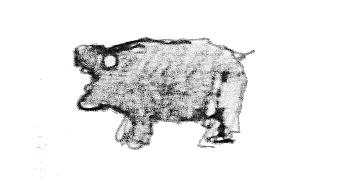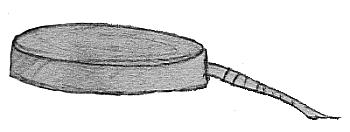Beyond Black Dogs and Mice
A survey of creatures which foreshadow depression, and their literary origins. Our writer gives the lowdown on the beasts that portend misery.
Churchill was beset by a metaphoric black dog; it sent him into long stretches of melancholy. Kafka had mice, and Sartre, I think, had cockroaches. These animals, familiars of gloom, have a long and rich history, from the nipple-nibbling Xlkrktk of Mayan folklore (a squirrel with tusks and human feet), to the soul-swallowing rabbits in the rock group Radiohead’s song Participle:
For your enjoyment, I picked out my five favorite metaphoric harbingers of depression—the tongue-biting eel, the furious fidget bird, the eohippus of misplaced destiny, the eternally recurring toad, and rat biscuits—along with, from the great literary works of the last few centuries, some representative quotes which refer to these unwelcome beasts.
1. The Tongue-Biting Eel

This is a slippery eel that bites your tongue, or sometimes your nose, and won’t let go. Once it has a good grip it delivers steady 9-volt shocks and makes a terrible squealing sound. It will stay there for a week or more before it dries up and falls off.
The Young Sinner’s Briar Patch of Endless Choler,
2. The Furious Fidget Bird
The Furious Fidget Bird is purple with a gray beak, and it lands on your shoulder and pecks your ear until you want to scream. When you hit it, it digs its talons deeper into your shoulders. After it makes you cry, it licks up your tears with a pitch-colored, oily tongue. The only way to make it leave is if you sing it lullabyes, even as it bites the skin around your eyebrows.
Mrs. Piker:
The Infested Mistress of Pilcher,
3. The Eohippus of Misplaced Destiny

This is the eohippus that comes to your door and barks out all the things you might have done, but didn’t.
Moira:
Albert:
Maria and Albert Yell for 90 Minutes With No Resolution,
4. Eternally Recurring Toad
This is the toad that is always there, at the edge of your vision, and instead of “ribbit,” it says “it’s hopeless, please die.” It usually addresses you by name.
The Thing That Happened When That Thing Happened,
5. Rat Biscuits

Rat biscuits are hard, sea-cracker-style biscuits that have rat tails hanging out of them. When you’re depressed, you’re only allowed to eat rat biscuits, which makes you even more depressed.
Shimmer:
The Royal Hedgehog Cast Adrift
